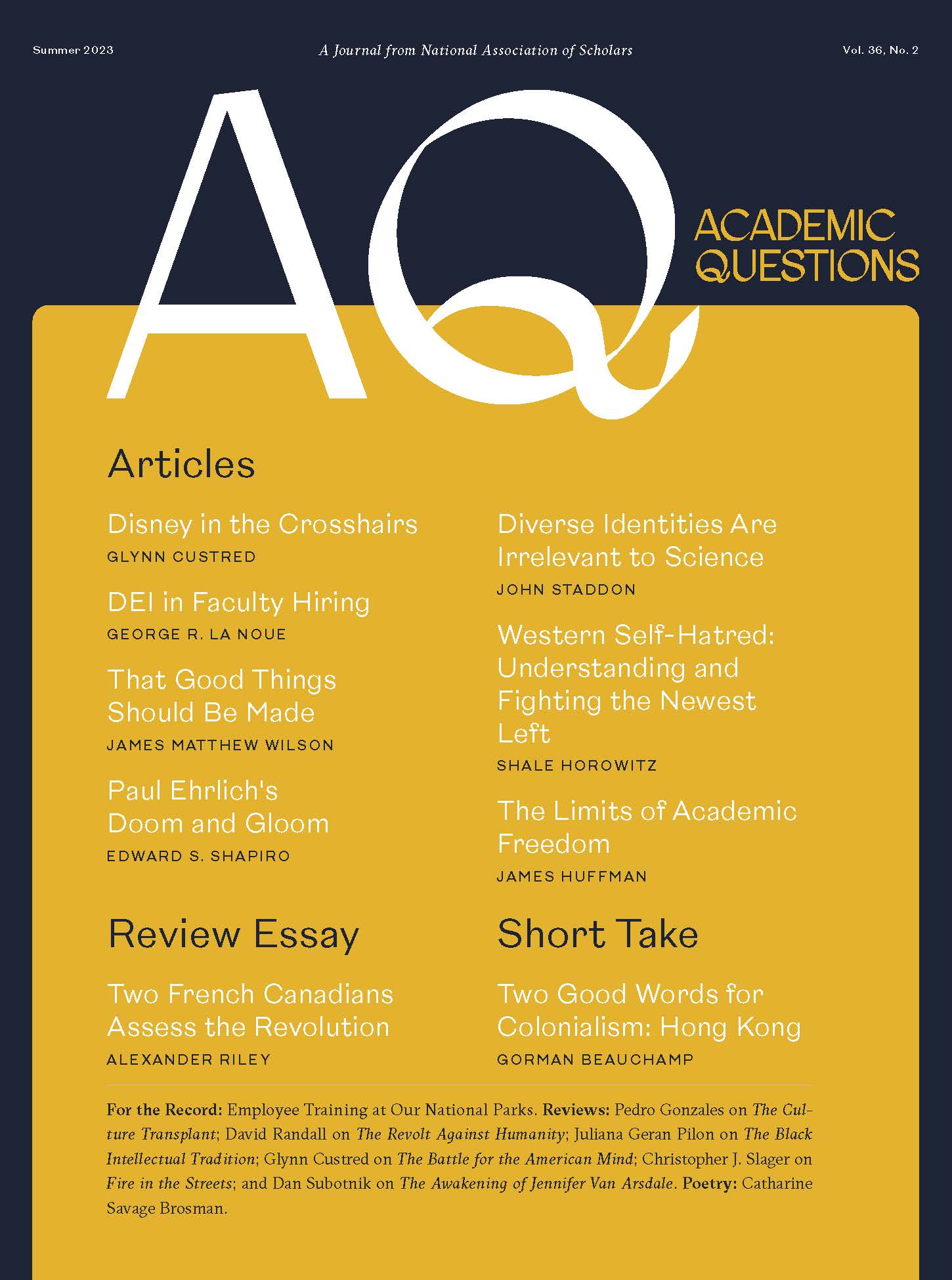Letter from a Friend
Introduction: The following is a part of two emails one of our editors received from a friend who has long served as a National Park Service Ranger, at present conducting tours at Independence National Historic Park in Philadelphia, PA. Established in June 28, 1948 the park is a United States National Park that preserves several sites associated with the American Revolution and the nation's founding history. It sits on fifty-five acres of Philadelphia’s historic district and is administered by the National Park Service. Recently, park personnel were required to undergo training conducted by an organization called The International Coalition for Sites of Conscience, founded in 1999. The ICSC (or SOC or “the coalition”) describes itself as the “only global network of historic sites, museums and memory initiatives that connects past struggles to today's movements for human rights. We turn memory into action.”
We are pleased to offer this as an example of how one person responded spontaneously to having political ideology imposed in the workplace, now a common occurrence for many American workers.
“A few minutes later, I said, ‘I am all for including people in the American story; but what I sense here is an attempt to discredit the American story.’"
February 17, 2023
Greetings: My co-workers and I were obligated to attend a "training session" with this group [ICSC]. They are up to no good, as you will see.
I went to the training, but—I am proud to say—fought the presenter each step of the way.
It was all about "re-framing" the tours at Independence Hall to include stories about "people that have been left out of the story" of our Founding. Apparently, this includes "indigenous people, women, the working class, Loyalists [to the King], fence-sitters, enslaved people [we aren't allowed to say “slaves” anymore], free African Americans, the common soldier, non-English speaking people, international participants, non-Christians, political dissidents, and [drumroll . . . ] LGBTQ."
As it happens, the tours are only twenty minutes long. The presenter said, “You could easily cut twenty percent of what you say now." Who and what will be cut? Washington, Adams, Franklin?
I first piped up when mention was made of the way in which the signage has been changed at Monticello to include Jefferson's "relationship" with Sally Hemings and to honor their "descendants." I said that
the biggest disappointment of my life has been the realization that most people are not interested in the truth; they are interested only in what is fashionable. The Sally Hemings story was made up by a newspaperman named James Callendar who hated Jefferson. Everyone who knows anything about the history of journalism knows that. It was popularized around forty years ago by an author named Fawn Brodie; but Dumas Malone, the dean of Jefferson historians, who wrote a six-volume biography of Jefferson . . .
Here the presenter cut me off with, "But the DNA . . . " I said, "The DNA doesn't prove that it came directly from Jefferson." One of my colleagues—bless him—interjected, "Wasn't it his nephew?" I continued, "There is no proof, but we permit a slander on the man that wrote the Declaration of Independence.”1
[NOTE: I'm not saying there wasn't hanky-panky on the old plantation: Apparently, Sally Hemings was Jefferson's wife's half-sister!].
Then we came to Harriet Beecher Stowe. It seems her house in Hartford has been taken over by this “Sites of Conscience” group and now it's all about "social justice." They want to get away from the "standard house tour." In the middle of the tour they take visitors into her library and discuss "racial justice."
I said: "This ignores the motivating passion of Mrs. Stowe's life, which is that she came from a family of clergymen and she was a Christian. She was a radical in that she thought slavery needed to be abolished yesterday, but she was conservative in that what she hated about it was that it destroyed the family; children were sold away from their parents."
The presenter gave me a hostile look and said, "But she wasn't an abolitionist until she lost a child of her own." I said, "That's not true! Don't you know anything about Henry Ward Beecher or Lyman Beecher?"
As this horrid thing ended, one of my co-workers asked the presenter, "What kind of tour would you like to see?" She answered that she'd like to see a tour in which the "marginalized" groups would know why the Declaration and Constitution are important.
I said, "I'd like to address that. Here is the most inclusive thing I've ever read. It's a quotation from Calvin Coolidge, who was President of the United States during the 150th anniversary of our country. He said: ‘To live under the American Constitution is the greatest political privilege that was ever accorded to the human race.' “The ‘human race’ includes everyone!" I continued, "The beauty of our country is that there isn't one person on that list [of 'marginalized groups'] who can't make a tremendous success in this country! The sky's the limit if you're willing to get over yourself!"
The presenter (who by this time looked like she wanted to kill me) said, "But in its time, it was responsible for horrible abuses and systemic racism!" (By now we were both yelling.) I yelled, "It wasn't responsible for them! And one of my favorite writers, Ben Stein, calls 'systemic racism' a 'wicked, paranoid phantasm'!"
She yelled, "I will not have this conversation with you!"
I said calmly, "You just did."
After the session one colleague came up to me and said, "Well done," and another patted me on the shoulder, as if to say, "Oh well. You tried."
It seems the National Parks Foundation—a taxpayer-funded organization—has made a huge monetary donation to the Sites of Conscience group—feels the need to answer to them, rather than to the taxpayers.
Last Monday, we had a sort of introduction to all this with the Deputy Superintendent [of the National Park Service]. She gave the litany of the marginalized groups. (I must add that this is all in preparation for the Semi-quincentennial—the 250th anniversary of the Declaration.)
I told her, "We've had this conversation before, and you said that, 'Whereas the Bicentennial was flag-waving and celebratory, the Semi-quincentennial will not be celebratory but commemorative—it will be about people telling their stories.' I told this to a friend who asked, 'What have you got? Soviets in charge of Independence Hall?'"
I continued, "That has always been the Communist Party line: 'Americans say they are the Land of the Free . . . But what about this group?!'"
In the course of the discussion, I went on to say that "every 'person of color' in this country should be profoundly grateful to Thomas Jefferson, because when he wrote, 'We hold these truths to be self-evident: That all men are created equal; that they are endowed by their Creator with certain inalienable rights . . . ' he dug that whole planter class into a hole they couldn't get out of."
A few minutes later, I said, "I am all for including people in the American story; but what I sense here is an attempt to discredit the American story."
The Deputy Superintendent answered calmly that the point was to remember, "You and I were not included in the Founding documents." I said, "Of course we were! In those days the man was considered the head of the family, and he voted on behalf of the family. It wasn't because they thought women were stupid." When eyebrows were raised, I hastened to add, "You can always find men who think women are stupid." That got a laugh.
The Deputy Superintendent had chosen to meet with small groups. Later in the day, a co-worker that attended one of the later sessions came up to me and whispered, "Boy did you make waves and ruffle feathers!"
Another sympathetic colleague told me that what I said led to "a pearl-clutching struggle session" among my co-workers. As he related the scene to me, I was pleased to note that I had not been misquoted.
The next day, first thing in the morning, a young colleague greeted me and said—with a note of approval in his voice—"I hear you called the Deputy Superintendent a Communist." I answered, "Pretty much."
I am proud of all this, in case you can't tell; recently I read an article by Mary Eberstadt in First Things called "The Zealous Faith of Secularism" in which she said that what has torpedoed conservatives is "self-censorship."
The End.
Your friend.
1 For this ongoing debate, see Herman Belz, “The Legend of Sally Hemings,” Academic Questions (Summer 2012); Glenn Ricketts, “Thomas Jefferson and Sally Hemings: OF COURSE HE DID IT,” Academic Questions (Fall 2011); Peter Wood, “Jefferson-Hemings Revisited,” National Association of Scholars, September 8, 2011, https://www.nas.org/blogs/article/jefferson-hemings_revisited.
Photo by Brian Wangenheim on Unsplash














